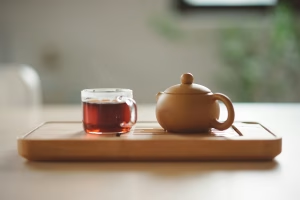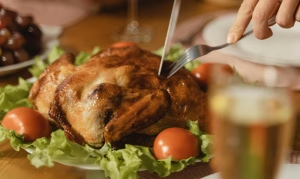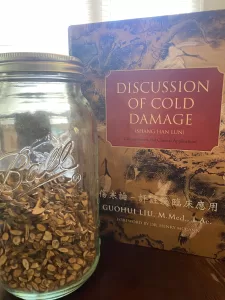Herbal Medicine
Yin & Yang of Stomach Pang!

Not all bellies are created equal, nor therefore, is all belly pain.
Stomach pain on the left tends to have more to do with organ function, whereas (in women) the left side might pertain more to ovarian function. Generally, belly pain that occurs above the umbilicus pertains to two of the three “yang” systems of the body, either “Shao Yang” or “Yang Ming,” either of which because of their connection to our intestines and digestive enzymes, might be accompanied by thirst for cold drinks, insomnia or agitation (not only as a result of the stomach pain), constipation, chest tightness, blurred vision, or blockage of the ears.
“Yang stomach pain,” as it were, tends to be constant—the abdomen feels firm and hard, resistant to touch. Conversely, pain that occurs below the umbilicus pertains to any one of the three “yin” systems of the body—gastrointestinal, endocrine, and/or hematological, tends to be more intermittent. The abdomen is softer, still tender to the touch, but it occurs more often in people who are prone to diarrhea and sensitive to the cold.
Thirst may still be present, though it is more likely for small sips of warm water, not big gulps of cold. That is because thirst of yin pathologies is a result of the GI tract’s lack of healthy fluids, whereas thirst of yang pathologies is from excessive inflammatory heat. If the same medicine is prescribed to both patients, one will improve and the other will exacerbate.
Yang pathologies might find relief with sour and/or bitter foods and medicinal—those whose mechanism is to drain, purge, and emolliate the abdomen.
Yin pathologies might find relief with sweeter (not by American standards) and more acrid (not by Indian standards) foods—those whose mechanism is to imbue the organs with more energy.
Another great way to distinguish diagnosis is by learning how people find relief.
If passing gas provides relief it is more likely a yang pathology, whereas if a complete bowel movement is needed it is more likely yin. If a hot compress feels good this is DEFINITELY a yin pathology, just as if ice water does it is DEFINITELY yang. A patient suffering from gastrointestinal, hormonal, or hematological weakness wouldn’t wish ice water on their worst enemy! That’s probably not true. People suffering with chronic “yin pathologies” tend to be understandably irritable, henceforth would very likely wish this on their enemies.
Then again, wouldn’t you wish acupuncture on your worst enemy, to transform them into a healthier, happier person to ultimately convert from worst enemy to best friend, or at the least, tolerable human being?
Where is your stomach pain, or that of a loved one?
What makes it better?
What makes it worse?
The answers to these questions and more can help us ascertain an accurate pattern diagnosis!
What Should We Be Drinking?
 How much water should we be drinking? Is cold water okay? Is coffee healthy or not, already? What about decaf? What about green tea? Green juices? Prune juices? Sparkling water??? Please tell me sparkling water is OK! It’s all I’ve got…
How much water should we be drinking? Is cold water okay? Is coffee healthy or not, already? What about decaf? What about green tea? Green juices? Prune juices? Sparkling water??? Please tell me sparkling water is OK! It’s all I’ve got…
Across the generations (and mediums) there have been many hydration gurus, and I suppose in this blog I’m throwing my hat into the ring, albeit really as just a hopefully qualified echo of Chinese medicine’s biological perspective.
Sparkling water is OK, but can irritate the bladder—should be kept to 1/day.
Room temp water is best, ideally half of our weight in ounces each day. Cold drinks can impair digestion, but again, once a day outside the context of a meal is no big deal, imo.
Juice is worse than people think—green juice not quite as good as people think. Green juices, without the sugars of fruit inside them, are fine, but should not replace real meals where salivary amylase is generated, we actually eat, and chew whole (green) vegetables.
One coffee/day should be fine for most people, but obviously has an excitatory and diuretic effect, so if one suffers with a lot of heat or dryness symptoms, should be minimized. These can include everything from insomnia and irritability to bloating or lack of appetite (dryness of digestive enzymes).
Green tea is preferable in people with “heat patterns,” and/or after a night of eating red meat, which can generate heat in the intestines. Again, because of its bitterness, people who tend to nausea, diarrhea, or lack of appetite should steer clear of green tea, and reach instead for…
PU-ERH TEA! Probably the healthiest thing one can drink besides clean, room temperature water, pu-erh is a black tea known for its naturally occurring pre and probiotics that enhance digestive and gut barrier function, the latter of which gets compromised by stress, medications, or alcohol. And I don’t know anyone who doesn’t check off at least one of these. Best taken hot.
I try to limit myself to 2 caffeinated beverages/day (I think no one should have more than 3), which are routinely a cup of Purity black coffee, followed by a cup of pu-erh, from either ARBOR or YUNNAN SOURCING, both of which offer organic and fair trade, high quality products. Highly recommend!
Tryptophan Foods & its Benefits

The ancient Chinese stressed the importance of eating foods that are “rich in qi and blood,” which upon scientific reflection, was in many cases referring to foods that are dense in the amino acid, tryptophan. Why?
The amino acid, tryptophan, is the precursor to the neurotransmitter, serotonin, which in turn regulates sleep and emotions, also digestive function, blood clotting, bone, and cardiovascular health. Circling back to Chinese medical terms, when your acupuncturist says that your gut is reliant upon strong and healthy “qi” to produce strong and healthy blood, this is what they mean. We need amino acids to produce not only literal blood, but also the neurotransmitters whose functions are synonymous with that of “the blood,” from a Chinese medical perspective.
Most people think of tryptophan around Thanksgiving and its effects of making us tired after the enormous holiday meal, but that fatigue is actually more likely due to the profound overconsumption of carbs and calories.
Other sources of tryptophan besides turkey are as follows, complete with warnings of their potential side effects and how to mitigate them:
- Chicken
- Is mass produced, so be sure to always consume in good, organic quality. Also can overstimulate the liver vessel, so ideal to consume with sour foods, such as lemon or sauerkraut to offset this effect. Unfortunately, the worst way to consume chicken is with hot sauce or spicy foods, which potentiates this effect.
- Beef
- Can generate excessive heat in the intestines, so should be consumed alongside bitter greens. Again, sad news: the worst way to consume is alongside alcohol, which can potentiate the heat effect. Eat plenty of bitters to counteract!
- Fish
- Beware of high mercury fish, as my wife always reminds me! Other than that, as the many centenarians of Okinawa and the Mediterranean know, there are little side effects to wild fish
- Eggs
- They’re just too expensive these days, and the inorganic variety are a problem. Other than that, eggs are nearly as perfect as fish 🙂
- Dairy
- Dairy has health benefits, but it is very cold and damp in its physiological behavior in the body. If you tend to low appetite, brain fog, diarrhea, bloating, or skin conditions you should avoid as much as possible.
- Soy
- Soy is also cold and damp and should be cooked alongside plenty of spices, onions, garlic, ginger, and even hot peppers, to offset its effect.
Besides tryptophan, another Thanksgiving cliche that benefits qi and blood is gratitude 🙂
Treatment for Loss of Voice

As we approach an exciting Yankees first World Series appearance in 15 years, Halloween, and an even scarier Election Day, there’s a good chance a lot of people will be losing their voices, as a result of screaming and shouting, hopefully for joy. Couple that with the dry autumn season, which corresponds with Chinese medicine’s lung channel, and many will be more prone to hoarseness and/or dry, hacking coughs.
Aphonia, or loss of voice, can happen for one of two reasons in Chinese medicine:
- The adrenals that secrete hormones, such as estrogen are weak and/or weak in reserves and there just isn’t enough fluid to lubricate the throat. For this, the best self-care recommendations are eating good quality pork and beefs and getting plenty of rest, with early bedtimes. Herbal medicine is preferable to acupuncture, namely formulas that help strengthen the kidneys and generate systemic fluids.
- Dryness exists more around the pancreas and stomach organs, subtly impairing digestion and giving rise to dry, inflammatory heat that tends to flare up into the chest and throat, then drying out the fluids up top and creating a vicious cycle. Labeled a “Shao Yang” pathology, this is common in singers and teachers, and can be treated with acupuncture and/or herbal medicine. Best self-care recommendations are possibly a bit more exercise, white rice, and/or congee and sweet potatoes, red date tea, and again, early bedtimes.
Of course, there are other causes, other etiologies and contributing factors, such as being on one’s menses, which dries out the internal blood, which in turn dries out either the kidneys or digestive organs, exemplifying these patterns as primary suspects to target in treatment.
Peppermint tea with honey is another fine option to treat, although if you are prone to bloating, loose stool, or lack of appetite, honey might not be the best thing for you.
On the other hand, ginger tea is likely to aggravate this situation due to its drying nature. While potentially very healthy, ginger has earned itself an undeserving reputation as unconditionally so, especially when treating people suffering from anemia or any chronic dryness.
When navigating any form of soreness or dryness from the chest up it is advisable to avoid hot sauce or spicy foods, as they can obviously aggravate the inflammation. Ironically, it is equally advisable to avoid iced cold drinks, which constrict vasculature around the throat and further impede the arrival of healthy systemic fluids to lubricate the region
Wishing everyone a lubricated throat and organs in these highly anticipated events!
I’m predicting Yankees in 7.
I’m predicting Kamala.
And in a group family effort, I will be Olaf from Frozen for Halloween. Pics to come!
Allergies and Chinese Medicine

Allergy season is here! Claritin and Allegra are flying off the shelves as people fly out of their minds, unable to stop mucus from plummeting from their orifices. Eyes are itchy, sneezing on trains is incessant, peaking everyone’s concern about the guy next to them. Is it Covid or allergies? Probably the latter, but not worth the risk. As the new fight or flight of cold and flu season goes: Mask or move?
In Chinese medicine allergies are a symptom of “wei qi deficiency,” or immunological compromise, in the springtime generally due more to a weakness in the body’s blood or healthy organ fluids—in fall more to excess inflammation and/or a weakened microbiome.
Fall is the season that corresponds more with the lungs and respiratory orifices, making allergies at this time of year a bit more biologically “normal” than those in the spring. Spring corresponds with the “liver,” which is to say the functional aspect of the body that uses blood to raise cellular energy upwards and outwards, including our immunological cells. Chances are good if one suffers with spring allergies, they might also be prone to anemia, dizziness, general dryness, or blood loss (which includes childbirth!).
While OTC medications are reductionist medicine—never the most thoughtful treatment—they are understandable to use as needed, temporarily and in moderation. Over time they can indiscriminately dry out our healthy fluids, especially in allergy sufferers of the spring variety. Persons with severe blood or fluid deficiency often find that OTC allergy meds are either ineffective or only temporarily effective, causing they or their doctor to increase dosages, thereby aggravating the root cause of the condition.
Enter the first mentioned and arguably most important herbal formula in our medicine’s most important text, cinnamon branch, or “gui zhi.” Cinnamon branch dilutes blood vessels to assist in circulating cellular energy, both of the immune system and otherwise (mostly) upward. Its primary indications include those of common viruses, such as headaches, sweating, neck and body pains, as cinnamon reaches the most superficial layer of the body to ward off external pathogens and circulate fluids back downward.
Its most famous formulaic combination includes licorice, ginger, dates, and most importantly paeonia root, whose job is to mitigate cinnamon’s warm, drying qualities, to nourish the blood and protect the stomach from over-heating (in other words, a more thoughtful Allegra). Two famous modifications of this formula are one that completely omits the cinnamon, and another that completely omits the paeonia, each of which radically changes its effects one way or the other. For spring allergies, we might consider omitting the cinnamon to enhance the blood nourish effects of paeonia on the liver meridian, which is ruled by spring. Conversely, at this time of year, as we begin our descent into the colder weather, we omit the paeonia, allowing the cinnamon to run wild, warming both the body’s surface and its internal organs below.
But of course, this is Chinese medicine, and we might do neither of these. Based on one’s tongue, pulse, and oral report, we might not even use a cinnamon-based formula! Gui Zhi is just one example of our line of thought in treating the immunological challenge that are allergies.

